

เขากำลังเฮ็ดหญัง เขากำลังพับผ้าอยู่
[เออ]นี้กะ ผ้าหนิกะเป็นเสี้ยเนาะ เขากำลังพับเสี้ยอยู่เนาะ
เขากะใซ้มือสองข้างของเขากำลังพับเสี้ย
เป็นหญังเขาต้องพับเสี้ยพ้อม อันนี้กะอาดสิแบบว่า ให้มันดูดี หลือว่าให้มันเบิ่งเป็นละเบียบเลียบล้อย เพื่อที่ว่าสิเอาเสี้ยผ้า เขาไปเก็บไว้ในตู้เสี้ยผ้าให้มันเป็นละเบียบเลียบล้อย ขั้นวางละเกะละกะ หลือว่าบ่พับ มันกะสิบ่เป็นละเบียบ กะสิบ่เป็นตาเบิ่งเนาะ
10
เขากำลังเฮ็ดหญังอยู่ เขากำลังพับส้งเนาะ หลือว่าพับผ้าหละเนาะ เขากำลังพับส้ง หลือว่าพับกางเกงขาญาวเนาะ ส้งขาญาวนั้นหละเนาะ กำลังพับ
แล้วเขาพับเฮ็ดหญัง กะอาดสิซักแล้วๆ กะเอาผ้าไปเก็บ เพื่อที่ว่าพับว่าสิให้มันเป็นเลียบล้อย เอาไปวางไว้ในตู้เสี้ยผ้า หลือว่าเอาไปไว้เทิงซั้น ให้มันกะสิเป็นละเบียบเลียบล้อย เป็นตาเบิ่ง
ดีกว่าที่สิไปวาง หลือว่าหม้นๆๆ ไว้นำกันในตะก้า หลือว่าใน หอั้น กะต่าเสี้ยผ้าเนาะ
Link to overview page
Link to dictionary
| Isaan | Pronunciation | Tones | Thai | English/Notes |
|---|---|---|---|---|
| เขา | khao | M | เขา | personal pronoun: he, she |
| กำลัง | gam-laŋ | M-HR | กำลัง | auxiliary indicating continuous or progressive action |
| เฮ็ด | het | H | ทำ | to do, to make |
| หญัง | ɲaŋ | M | อะไร, เป็นหญัง = ทำไม | 1. what {เขากำลังเฮ็ดหญัง = What is he doing?} {ธูปเอาไว้เฮ็ดหญัง = What are incense sticks for?} 2. something, anything, (nothing) 3. เป็นหญัง[...]คือ in initial position: why {เป็นหญังเขาคือใส่บักพิกลงไปในกวยเตียว = Why is he putting chili in [his] noodle soup?} {เป็นหญังหน้าต่างมันคือเปิด = Why is the window open?} {เป็นหญังมันคือมีควนไฟ = Why is there smoke?} |
| พับ | phap | H | พับ | to fold |
| ผ้า | pha: | LF | ผ้า | 1. clothes 2. cloth |
| อยู่ | yu: | H | อยู่ | 1. to be (located) at 2. yet, still 3. auxiliary indicating continuous or progressive action {ทอดปาอยู่ในกะทะ = (in the process of) frying a fish in the pan} {แม่กำลังเมี้ยนเฮียนอยู่ = mother is cleaning/tidying up the house} |
| เออ | ə: | M | 1. discourse marker: confirmation 2. discourse marker: turn-taking 3. discourse marker: preceding a correction 4. filler word |
|
| นี้ | ni: | HF | นี้ | 1. this 2. here |
| กะ | ga | M | ก็ | 1. then, consequently 2. also |
| หนิ | ni | M | นี่แหละ, เหรอ/หรอ | 1. particle used to emphasize a statement or form (or add to) a question {เป็นตาแซบคือหญังหนิ = it's really tasty} {เคี่ยงพอเท่าๆ หนิ = the [radio] is appropriately sized (i.e., not too large)} 2. variant of นี้ = this Notes: translation to be determined; maybe sometimes like Thai นี่แหละ; other examples given: อยู่ใสหนิ อยู่ตลาดหนิ กินเข้าไป่หนิ |
| เป็น | pen | M | เป็น | 1. to be, to exist 2. to be able to 3. to suffer, sth. happens to 4. เป็นหญัง[...]คือ in initial position: why? {เป็นหญังเขากะคือแปงฟัน = Why is he brushing his teeth?} {เป็นหญังเคี่ยงบินมันคือสิตก = Why is the airplane falling down?} |
| เสี้ย | si:a | LF | เสื้อ | shirt |
| เนาะ | nɔ | H | เนาะ | final particle: makes the statement softer, looking for agreement |
| ใซ้ | sai | HF | ใช้ | to use |
| มือ | mʉ: | HR | มือ | 1. hand 2. front leg/paw (e.g., of a cat) |
| สอง | sɔ:ŋ | M | สอง | two |
| ข้าง | kha:ŋ | LF | ข้าง | 1. side {มีหูจับสองข้าง = there are handles on both sides} 2. next to {วางอยู่ข้างๆ ก่องใบใหญ่ = it's placed next to the large box} {เขายืนอยู่ข้างๆ อีกพุหนึ่ง = he's standing next to another person} 3. clf. for body parts which come in pairs (eyes, ears, legs etc.) {เขามีตาสองข้าง = she has two eyes} |
| ของ | khɔ:ŋ | M | ของ | of, belonging to |
| ต้อง | tɔŋ | HF | ต้อง | to have to, must |
| พ้อม | phɔ:m | HF | พร้อม | at the same time, also, too {มีตะเว็นพ้อม = the sun's out, too} {กะทะมีด้ามพ้อม = the pan has also a handle} |
| อัน | an | M | อัน | 1. thing, object 2. general clf. for objects |
| อาด | a:t | LF | อาจ | 1. might, may, will 2. likely |
| สิ | si | M | จะ | future tense auxiliary {เขากำลังสิตื่น = he's about to wake up} {สิไปตะหลาด = [I'm] going to the market} |
| แบบ | bɛ:p | LF | แบบ | 1. example, model, kind 2. style, form, pattern, design |
| ว่า | wa: | H | ว่า | 1. that, as {คำว่า X = the word X} 2. to say |
| ให้ | hai | LF | ให้ | 1. to give {หมอกำลังเอายาให้คนป่วยกิน = the doctor is giving the patient medicine} 2. for 3. to allow, to be allowed |
| มัน | man | HR | มัน | it (also used to refer to people) |
| ดู | du: | M | ดู | to look |
| ดี | di: | M | ดี | good |
| หลือ | lʉ: | M | หรือ | or |
| เบิ่ง | bəŋ | H | ดู | 1. to look at, to see, to watch {เบิ่งโทละทัด = to watch TV} {เบิ่งหนัง = to watch a movie} 2. to guess {เบิ่งซงแล้ว ... = [I] guess / from what it looks like ...} |
| ละเบียบ | la-bi:ap | H-LF | ระเบียบ | 1. order, system, proper arrangement 2. orderly, tidy, neat |
| เลียบล้อย | li:ap-lɔ:i | HF-HF | เรียบร้อย | neat, tidy, refined, well-behaved, in good order |
| เพื่อที่ | phʉ:a-thi: | H-H | เพื่อที่ | in order to, so that Notes: the vowel เอือ is likely to be a Thai loan |
| เอา | ao | M | เอา | to take, to give {เขากำลังเอาก่องไปซั่ง = he's taking the boxes to weigh them} {หมอกำลังเอายาให้คนป่วยกิน = the doctor is giving medicine to the patient} {เอาไว้ถ้า = is for, is used for, has the purpose of} |
| เสี้ยผ้า | si:a-pha: | LF-LF | เสื้อผ้า | clothes, clothing |
| ไป | pai | M | ไป | 1. to go 2. auxiliary indicating action extending into the future |
| เก็บ | gep | M | เก็บ | 1. to collect, to gather, to accumulate, to pick/harvest {เก็บเงิน = to save money} {in a restaurant: เก็บเงิน = to get the bill} {เก็บน้ำ = to collect and store water} {เก็บผัก = to harvest vegetables} 2. to keep 3. to take in, to put away, to tidy up |
| ไว้ | wai | HF | ไว้ | 1. to keep, to put, to place, to retain, to save, to reserve {เขาเอาหัวของเขาไว้ใส = Where does she put her head?} {หมาสิเลี้ยงไว้บ้าน = dogs are kept/raised in the house} {ไก่เลี้ยงไว้ในคอก = chicken are kept/raised in a coop} {หน้ามันบังไว้ = the face is covered/not visible} {เขาเอาโทละสับวางไว้หู = he holds the phone to his ear} 2. for {นาลิกาปุกมีไว้เฮ็ดหญัง = What is an alarm clock for?} {หม้อเอาไว้เฮ็ดแนวกิน = a pot is used to make food} {ก่องเอาไว้เฮ็ดหญัง ก่องเอาไว้ใส่ของ = What is the box for? It's for putting in stuff.} Notes: see also ไว้ถ้า |
| ใน | nai | HR | ใน | in, within |
| ตู้ | tu: | HF | ตู้ | 1. cupboard, cabinet 2. clf. for cupboards, cabinets, ATMs {ตู้เอทีเอ็ม = ATM} {เป็นตู้ไว้ถ้ากดเงิน = it's an [ATM/machine] for withdrawing money} {ตู้เสี้ยผ้า = wardrobe} |
| ขั้น | khan | LF | เมื่อ | when, if |
| วาง | wa:ŋ | HR | วาง | to place, to set/put down {โทละสับ/phone: วางสาย = to hang up} {มีเกิบวางอยู่ในก่อง = there are shoes in the box} {มือข้างหนึ่งเขาวางอยู่เทิงโต่ะ = he's put one of his hands on the table} |
| ละเกะละกะ | la-ge-la-ga | H-M-H-M | ระเกะระกะ | messily, disorderly, untidy, scatteredly |
| บ่ | bɔ: | H | ไม่ | 1. no, not 2. question particle, transforming a statement into a question Notes: spelling exception in line with common usage on social media |
| ตาเบิ่ง | ta:-bəŋ | M-H | น่าดู | attractive, worth looking at, worth seeing |
| ส้ง | soŋ | LF | กางเกง | trousers Notes: synonym: กางเกง |
| หละ | la | M | แหละ, ล่ะ | 1. auxiliary for emphasis at the end of a phrase 2. auxiliary to create a follow-up question: And what about ... ? {แล้วลดคันที่สองหละ = And what about the second car?} |
| กางเกง | ga:ŋ-ge:ŋ | M-M | กางเกง | trousers Notes: synonym: ส้ง |
| ขา | kha: | M | ขา | leg {ขาหน้า = front leg} {ขาหลัง = hind leg} {ส้งขาญาว = long trousers} |
| ญาว | ɲa:o | HR | ยาว | long |
| นั้นหละ | nan-la | HF-M | นั่นแหละ | auxiliary for emphasis at the end of a phrase |
| แล้ว | lɛ:o | HF | แล้ว | 1. finished 2. already 3. and then, and next (especially แล้วกะ) 4. auxiliary for past tense |
| ซัก | sak | H | ซัก | to wash {ซักผ้า = to do the laundry} |
| เทิง | thə:ŋ | HR | บน | 1. on, on top of, at, in {เทิงโต่ะ = at/on the table} {กบมันนั่งอยู่เทิงใบบัว = the frog is sitting on the lotus leaf} {เทิงท้องฟ้า = in the sky} {มันแล่นอยู่เทิงลาง = [the train] runs on rails} {มีคนนั่งอยู่เทิงลดสามล้อสามคน = there are three people sitting in the tuk tuk} 2. up, upward Notes: pronunciation: also realized as ทัง |
| ซั้น | san | HF | ชั้น | 1. floor, shelf, step of a staircase {ซั้นเก็บเสี้ยผ้า = clothes shelf} {ซั้นวางหนังสือ = book shelf} 2. level, grade, class {ซั้นมอสี่ = secondary school grade four} 3. layer |
| กว่า | gwa: | H | กว่า | more, more than, comparative: as, than |
| ที่ | thi: | H | ที่ | 1. that, which {คนที่ยืนอยู่ฝั่งขวา = the person which is standing on the right = the person standing on the right} {เว้าคำที่บ่สุพาบ = to speak words which are impolite = to speak impolitely} 2. for ordinal numbers {ที่สาม = third} |
| หม้น | mon | LF | ไม่เป็นระเบียบ | messily, untidy Notes: pronunciation and translation to be confirmed |
| นำกัน | nam-gan | HR-M | together, jointly, with one another {บ่สามาดใซ้นำกันได้ = can't be used together} {เขากำลังญ่างนำกัน = they are walking together} {เหล้นบ่าดนำกันบ่ = Shall we play basketball?} | |
| ตะก้า | ta-ga: | M-HF | ตะกร้า | basket |
| หอั้น | an | LF | filler word | |
| กะต่า | ga-ta: | M-H | ตะกร้า | basket |